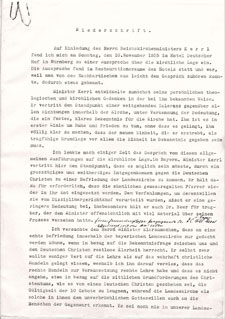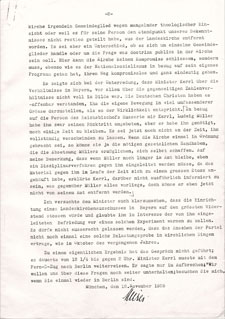Hans Meiser: Resisting a Church Committee
In 1933-34, Regional Bishop Hans Meiser (1881–1956) succeeded in repudiating the Bavarian German Christians’ claims to power and gathering the overwhelming majority of pastors and parishes behind him. At the turn of 1934-35, however, the Bavarian German Christians began to regroup and to establish local groups. Their stated goal also continued to be to topple the church government under Regional Bishop Meiser and to seize power themselves. In order to protect parishes from the German Christians’ Nazi ideology, Meiser proposed the establishment of Confessional Fellowships, the members of which would commit themselves to the regional church’s confession and order.
The Confessional Fellowships was soon outnumbered the German Christians’ local groups by ten to twentyfold. Although the 15,000 Bavarian German Christians remained far fewer in number than the over 1.6 million church members in total, they once again became a threat to the church government under Meiser in 1935. In the fall, Reich Minister of Church Affairs Hanns Kerrl (1887–1941) began appointing so-called church committees in the Reich Church and in the destroyed regional churches. They took over the governments of the affected churches and disempowered the previous church governments. German Christians were also involved in these committees. Then, the Bavarian German Christians worked toward forming a church committee in Bavaria, too.
This would have amounted to the fall of the Bavarian church government. Meiser therefore attempted to prevent the formation of such a committee. He had to assert his authority against the will of the Reich Minister of Church Affairs, who not only appointed a committee but also demanded the lifting of the disciplinary measures imposed on German Christians by the church government and the free development of their work in the regional church.
At a meeting held on November 10, 1935, Meiser made clear to the minister once and for all that bringing peace within the Bavarian regional church could only be contemplated when there is complete clarity between us (= the church government) and the German Christians with respect to the confessional issue. Meiser indicated there would be utmost resistance in the event a church committee was appointed.
In December, the minister gave Meiser an ultimatum demanding the unconditional reinstatement of disciplined German Christian pastors. He reminded Meiser of his authority in the Bavarian regional church with which he could make the step demanded plausible to his pastors. Meiser replied that he only had his authority to handle ecclesiastically but could not exercise it for the step being demanded (K. Steinbauer, Zeugnis 1, p. 300).
Despite the Reich Minister of Church Affairs’ threats, Meiser’s steadfastness ultimately prevented the appointment of any church committee in Bavaria, enabled the church government to remain in office and thus kept the regional church “intact”.
Meiser’s conduct even met with the approval of his critics within the church. Whereas members of the Bavarian Brotherhood of Pastors hard sharply criticized him for his approval of the church committees appointed by the Nazi state in other regional churches, they explicitly recognized his conduct toward the Reich Minister of Church Affairs as truly ecclesiastical. In a letter at Christmastime in 1935, his greatest critic, Karl Steinbauer (1906–1988), vicar in Penzberg, thanked him sincerely and from the heart for this my best Christmas gift (K. Steinbauer, Zeugnis 1, 302).
Source / title
- © Landeskirchliches Archiv Nürnberg, Pers. 36, Nr. 103


